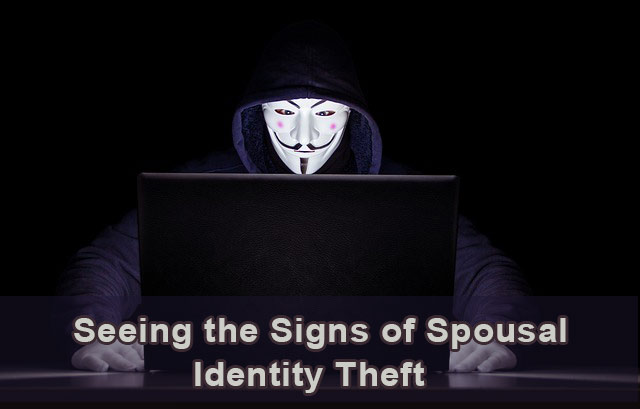The basic definition of identity theft is obvious to most: Someone uses your identity, information, or credentials to do something they weren’t supposed to, like open a bank account or take out a loan without your permission.
People might imagine that identity thefts are pulled off by scammers in far-off countries or dingy internet cafes, but sometimes the common crime gets pulled off a lot closer to home.
Spousal identity theft is common, but also often overlooked because people make excuses: It only happened once, it’ll never happen again, it’s not illegal or identity theft because it’s your spouse that did it.
The truth is that it’s identity theft just like any other.
Here are some of the most important facts surrounding spousal identity theft, including what to do if you are a victim.
Is it Illegal?
One of the most common reasons why spousal identity theft or fraud goes unreported is because people don’t know it’s illegal – or they’re forced into a position where they feel threatened if they were to report it.
Yes, identity theft is still a criminal act when it’s committed by a partner, fiancé or spouse and it still must be reported in the same way when it happens.
It might be hard to accept that your spouse is capable of a serious criminal act like identity theft or fraud, but it happens every day – and might even be something that happens regularly within the context of a physically or emotionally abusive relationship.
Sometimes spousal identity theft and fraud involve abuse of other types, but this isn’t always the case. (But if abusive describes your situation, seek help: There are always appropriate outreach projects that can give you a better, safer and more independent life.)
Next, let’s move on to some examples of spousal identity theft and what you can do if you are a victim.

Seeing the Signs of Spousal Identity Theft
Cases of spousal identity theft can be more difficult to recognize: It’s harder to see the truth about a situation while you’re right in the middle of it and people will often make excuses for a spouse for surprisingly terrible behavior, including of the criminal type.
Spousal identity theft means your spouse using your identity instead of their own for any gain, usually financial.
The most common ways in which you can spot it includes:
- Transactions, sales and items on your bills and statements that you don’t recognize and can’t account for.
- Calls and messages from creditors about credit that you didn’t apply for.
- Bills in your name for items or transactions that you didn’t consent to
- The inability to get loans due to your credit score or seeming outstanding credit that you didn’t know you have.
- Claims that you already have an account registered to your name when submitting your information. This can apply to store accounts, social media accounts and any other accounts that you might apply for to find out that someone has beat you to it.
Are you being denied access?
If your spouse denies you access to your own bank accounts, statements, cards or identity documents, it becomes both a case of identity theft and abuse. Seek help with outreach groups and legal authorities if this describes your situation.

Unauthorized-Account-Usage
Unauthorized account usage is a common example of identity theft by partners and spouses.
A partner might withdraw a large amount of money from your account without your knowledge and sign your name to it, or they might pay for an online transaction using your card and information pretending to be you.
They might also deny you access to your cards or accounts, using them in your name entirely. This is a more serious case of spousal abuse and fraud, and as shocking as it might sound to some people, it happens to some people every day.
If your partner buys a speaker system and charges it to your joint bank account without telling you, that’s a bad financial decision: But if your partner charges it to your bank account and forges your signature or steals your card to do it, that’s fraud.

Opening Accounts, Cards or Loans
Any accounts, cards or loans that are applied for without your knowledge (and subsequently in your name and with your details) are illegal, whether it’s done by a stranger on the other side of the world or by your spouse.
This might be noticed when you receive statements or charges you didn’t know about, or when creditors start contacting you asking for their money.
Whether you want to confront your spouse is up to you and your situation but contacting your bank’s fraud department should be a given. Otherwise, you might be held responsible for these charges – but the situation changes if you’re able to file a fraud report in time
Unknown Insurance Policies
Other than checking your bank statements for unrecognized charges, you should also check your identity number against any possible open insurance policies.
A common form of identity theft happens when people take out insurance policies in someone else’s name. This means that they get to claim the benefits when this false insurance policy cashes out.
Sometimes it’s house or goods insurance, but in many cases, it applies to life insurance.
It’s easy enough to check whether there are insurance policies to your name, and if something does come up that you didn’t apply for, it’s always serious and should be canceled and reported immediately.
Claimed in Your Name
Sometimes identity theft involves using your information to claim benefits like monthly pension payments.
If this happens to you, you might notice that your regular statements don’t match up, you get notified that your money has been claimed for, or you find out that you can’t claim it when you try for yourself because someone has already done it for you.
What Now?
Identity theft puts your relationship on shaky ground, and what you want to do from there is up to you.
Legally, the right thing to do is to contact the fraud department of your bank or financial institution: It’s important to set the record straight or you’ll have to face consequences and payments that you aren’t responsible for.
For serious cases where emotional or physical spousal abuse is mixed with identity theft or fraud, approach law enforcement and look out for community outreach projects that can offer a safe house in the real sense of the word.
Useful Links
Need help? Approach the Australian Federal police, your local branch of law enforcement or the Department of Home Affairs in your country, county or state for more.
This is a contributor’s article by By Alex J. Coyne















